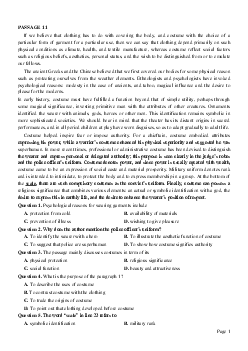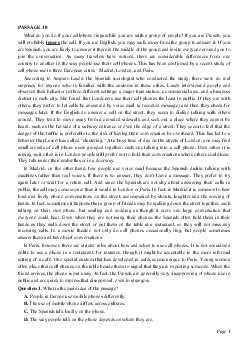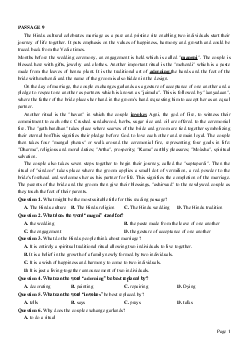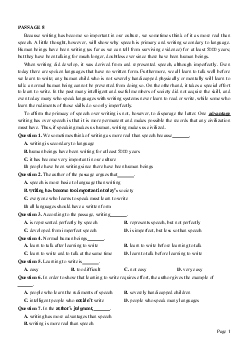


Preview text:
PASSAGE 24
Successful students often do the followings while studying. First, they have an overview before
reading. Next, they look for important information and pay greater attention to it (which often needs
jumping forward or backward to process information). They also relate important points to one another.
Also, they activate and use their prior knowledge. When they realize that their understanding is not good,
they do not wait to change strategies. Last, they can monitor understanding and take action to correct or
“fix up” mistakes in comprehension.
Conversely, students with low academic achievement often demonstrate ineffective study skills. They
tend to assume a passive role, in learning and rely on others (e.g., teachers, parents) to monitor their
studying, for example, low-achieving students often do not monitor their understanding of content; they
may not be aware of the purpose of studying; and they show little evidence of looking back, or employing
“fix-up” strategies to fix understanding problems. Students who struggle with learning new information
seem to be unaware that they must extent effort beyond simply reading the content to understand and
remember it. Children with learning disabilities do not plan and judge the quality of their studying. Their
studying may be disorganized. Students with learning problems face challenges with personal
organization as well. They often have difficulty keeping track of materials and assignments, following
directions, and completing work on time. Unlike good studiers who employ a variety of study skills in a
flexible yet purposeful manner, low-achieving students use a restricted range of study skills. They cannot
explain why good study strategies are important for learning; and they tend to use the same, often
ineffective study approach for all learning tasks, ignoring task content, structure or difficulty.
(Source: Adapted from Study Skills: Managing Your Learning — NUI Galway)
Question 1. What is the topic of the passage?
A. Successful and low-academic achieving students
B. Successful learners and their learning strategies
C. Study skills for high school students
D. Effective and ineffective ways of learning
Question 2. The word “prior” in the first paragraph is closest meaning to ? A. important B. earlier C. forward D. good
Question 3. According to the passage, what can be learnt about passive students?
A. They depend on other people to organize their learning
B. They are slow in their studying
C. They monitor their understanding
D. They know the purpose of studying
Question 4. Which of the followings is NOT an evidence of monitoring studying?
A. Being aware of the purpose of studying
B. Monitoring their understanding of content
C. Fixing up mistakes in understanding
D. Looking at their backs
Question 5. According to the passage, to learn new information, low-achieving students do NOT . A. just understand it
B. relate it to what they have known C. simply remember it D. read it
Question 6. In compared with low-achieving students, successful students use . Page 1
A. aimless study techniques
B. various study skills
C. restricted strategies
D. inflexible study ways
Question 7. The underlined pronoun “They” in the last sentence refers to . A. study strategies B. study skills
C. low-achieving students D. good studiers ĐÁP ÁN 1-D 2-B 3-A 4-D 5-B 6-B 7-C
LỜI GIẢI CHI TIẾT Question 1: D
Chủ đề của đoạn văn là gì?
A. Học sinh thành công và học tập thấp
B. Người học thành công và chiến lược học tập của họ
C. Kỹ năng học tập cho học sinh trung học
D. Cách học hiệu quả và không hiệu quả
=> Successful students often do the followings while studying. [...]
Conversely, students with low academic achievement often demonstrate ineffective study skills.
Dịch: Sinh viên thành công thường làm theo sau trong khi học tập. [...] Ngược lại, sinh viên có thành tích
học tập thấp thường là do biểu hiện của các kỹ năng học tập không hiệu quả. Question 2: B
Từ ‘trước đây” trong đoạn đầu tiên có nghĩa gần nhất với ? A. quan trọng B. sớm hơn C. chuyển tiếp D. tốt Question 3: A
Theo đoạn văn, có thể thấy được gì từ học sinh thụ động?
A. Họ phụ thuộc vào việc người khác tổ chức việc học của họ B. Họ chậm học
C. Họ theo dõi sự hiểu biết của họ
D. Họ biết mục đích học tập
=> They tend to assume a passive role, in learning and rely on others (e.g., teachers, parents) to monitor their studying,
Dịch: Họ có xu hướng đảm nhận vai trò thụ động, trong học tập và dựa vào người khác (ví dụ: giáo viên,
phụ huynh) để theo dõi việc học của họ, Question 4: D
Điều nào sau đây KHÔNG phải là bằng chứng của việc theo dõi học tập?
A. Nhận thức được mục đích học tập
B. Theo dõi sự hiểu biết của họ về nội dung
C. Sửa chữa sai lầm trong sự hiểu biết D. Nhìn vào lưng họ Page 2
=> low-achieving students often do not monitor their understanding of content; they may not be aware of
the purpose of studying; and they show little evidence of looking back, or employing “fix-up” strategies
to fix understanding problems.
Sinh viên đạt kết quả thấp thường không theo dõi sự hiểu biết của họ về nội dung; họ có thể không nhận
thức được mục đích học tập; và họ cho thấy rất ít bằng chứng về việc nhìn lại, hoặc sử dụng các chiến
lược khắc phục lỗi để sửa chữa sai lầm trong nhận biết Question 5: B
Theo đoạn văn, để tìm hiểu thông tin mới, học sinh đạt kết quả thấp KHÔNG NÊN. A. chỉ cần hiểu nó
B. liên quan đến những gì họ đã biết C. chỉ cần nhớ nó D. đọc nó
=> Students who struggle with learning new information seem to be unaware that they must extent effort
beyond simply reading the content to understand and remember it.
Dich: Những sinh viên đối phó với việc học thông tin mới dường như không biết rằng họ phải nỗ lực hết
mức ngoài việc đọc nội dung để hiểu và ghi nhớ nó. Question 6: B
So với học sinh đạt kết quả thấp, học sinh thành công sử dụng .
A. kỹ thuật nghiên cứu vô mục đích
B. kỹ năng học tập khác nhau
C. chiến lược hạn chế
D. cách học không linh hoạt
=> Unlike good studiers who employ a variety of study skills in a flexible yet purposeful manner, low-
achieving students use a restricted range of study skills
Dịch: Không giống như học sinh giỏi sử dụng nhiều kỹ năng học tập một cách linh hoạt nhưng có mục
đích, sinh viên đạt kết quả thấp sử dụng một loạt các kỹ năng học tập bị hạn chế. Question 7: C
Đại từ được gạch chân “They” trong câu cuối cùng đề cập đến .
A. chiến lược học tập B. kỹ năng học tập C. học sinh kém D. học sinh giỏi
=> Unlike good studiers who employ a variety of study skills in a flexible yet purposeful manner, low-
achieving students use a restricted range of study skills. They cannot explain why good study strategies are important for learning;
Dịch: Không giống như học sinh giỏi sử dụng nhiều kỹ năng học tập một cách linh hoạt nhưng có mục
đích, sinh viên đạt kết quả thấp sử dụng một loạt các kỹ năng học tập bị hạn chế. Họ không thể giải thích
tại sao các chiến lược học tập tốt lại quan trọng cho việc học; Page 3




